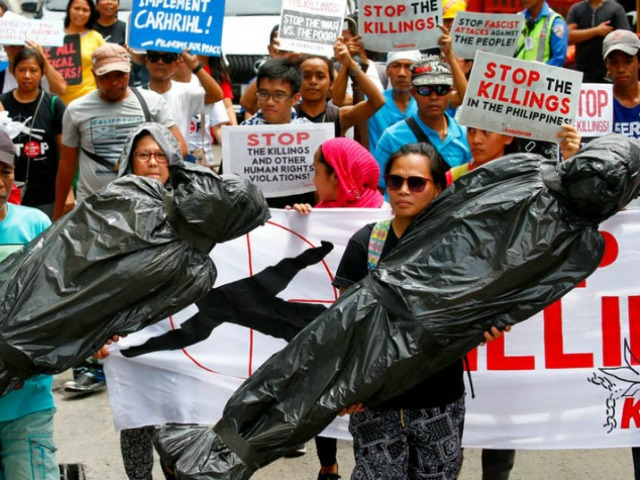Philippine president Rodrigo Duterte has once against threatened human rights activists, stating Wednesday that he would allow police to shoot human rights activists if they “are obstructing justice.”
In public statements translated by Rappler, Duterte said he would assign police facing suspected drug criminals to “shoot those who are part of [the operation]. If they are obstructing justice, you shoot them, so they can really see the kinds [sic] of human rights.”
Duterte protested that he did not feel that human rights advocate organizations condemned violent criminals with the same fervor as they condemned him and his administration for trying to stop crime. According to the Rappler translation, Duterte said, “Where was the human rights [community]? They could not even utter it in public. ‘Look, do not do that to me,’ says human rights groups. Nothing. Then when it comes to criminals, you will proclaim, ‘human rights violations.'”
“The human rights groups are now investigating,” he said, referring to police activity against drug crime. “One of these days, you human rights groups, I will also investigate you. That’s the truth. For conspiracy.”
Duterte has previously promised that should any human rights observer visit the Philippines, he would “whack him in the head,” and called human rights activists “stupid” for making “it appear that the people you kill are saints, as if they are pitiful or innocent,” and not violent criminals.
Duterte’s outrage this time appeared to be targeted against human rights NGOs like Amnesty International, which had recently condemned the Philippine police for logging in the deadliest day in Duterte’s tenure. At least 21 drug suspects died on Tuesday in a raid on what police believed to be a drug trafficking hub in which they reportedly found methamphetamine, a weapons cache, and paraphernalia.
The Philippine Star quoted Amnesty International Southeast Asia director James Gomez as lamenting the “lawless ‘war on drugs'” that Duterte had launched and accusing him of targeting the least privileged and most impoverished Filipinos. “No one is bearing the brunt of this brutality more than the poorest communities in areas such as Bulacan province, a hotspot for extrajudicial executions since the president took power, and the scene of 21 of yesterday’s 32 killings,” Gomez said in a statement.
Gomez went on to call for “an internationally led investigation into the ‘war on drugs’ and the carnage currently taking place in the Philippines on a daily basis.”
The incident in question occurred on the same day as a speech by Duterte in which he claimed that he no longer believed his government could fully eradicate drug crime. Duterte won the presidency largely on a promise to eliminate drug crime and restore peace to impoverished parts of the country ravaged by the drug trade, and by youth use of methamphetamine (locally known as “shabu” specifically). As mayor of Davao city for 22 years, Duterte earned a reputation for making the city safe for tourists by taking a hard line on violent criminals.
On Tuesday, however, Duterte lamented that the scope of the drug trade in the Philippines was too big. “Others can’t do it. How can we? Those drugs, we can’t control it,” he told an audience. “We do not have the equipment. It’s not enough. And you know the coastline.”
Duterte’s spokesman, Ernesto Abella, defended Duterte’s orders to push for more drug raids in areas like Bulacan province, which Amnesty International implied was too poor to withstand sustained police assaults. He noted that the nearly one dozen dead on Tuesday were not all killed in a “single action,” but as part of “a wide ranging simultaneous police operations against illegal drug offenders conducted in the whole province of Bulacan.”

COMMENTS
Please let us know if you're having issues with commenting.